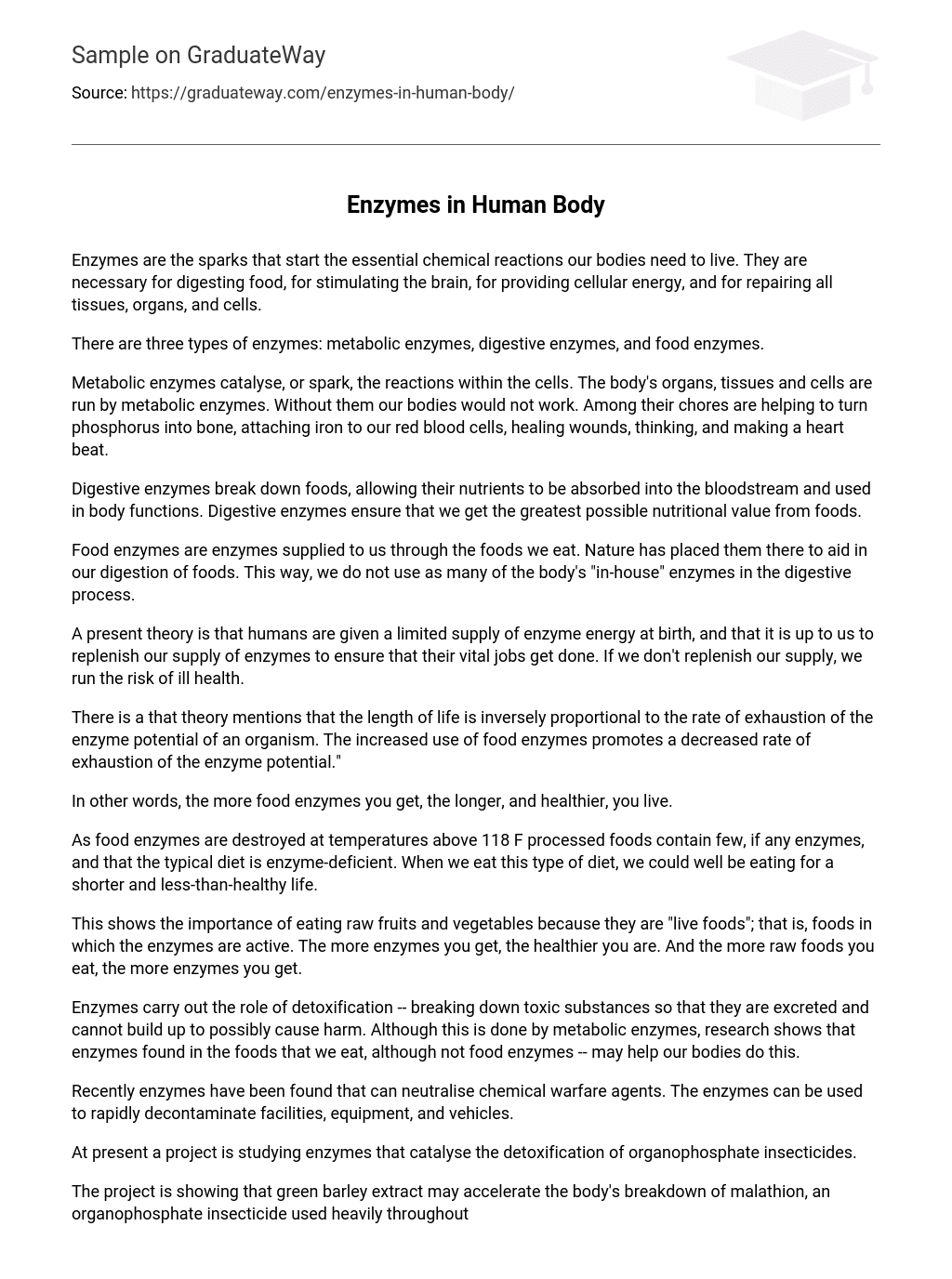Enzymes play a vital role in various chemical reactions within our bodies, including digestion, brain function, cellular energy production, and the renewal of tissues, organs, and cells.
Enzymes can be classified into three categories: metabolic enzymes, digestive enzymes, and food enzymes.
Metabolic enzymes are vital catalysts for cellular reactions, playing a crucial part in the operation of organs, tissues, and cells within our bodies. These enzymes are indispensable for bodily functions like converting phosphorus into bone, binding iron to red blood cells, aiding wound healing, facilitating cognitive processes, and sustaining heart rhythm.
Digestive enzymes are essential in breaking down foods and facilitating the absorption of nutrients into the bloodstream, playing a vital role. This is critical for maximizing the nutritional advantages obtained from foods.
Food enzymes can be found naturally in the foods we eat. These enzymes help with digestion and decrease our dependence on our body’s own digestive enzymes.
It is commonly believed that humans have a limited amount of enzyme energy from birth. It is our duty to replenish these enzymes so they can carry out crucial functions. Neglecting to replenish our enzyme reserves may lead to potential health issues.
According to a theory, the lifespan of an organism is affected by the reduction in its enzyme potential. Additionally, this theory proposes that consuming food enzymes can help to decelerate this decline.
Increasing the intake of food enzymes can result in a lengthened and improved lifespan.
When food is processed and heated above 118 F, it loses its food enzymes and therefore lacks them. Consequently, this can result in a diet that lacks enzymes, which can have negative effects on both lifespan and overall health.
The importance of consuming raw fruits and vegetables is highlighted because they are considered as “live foods” that contain active enzymes. Increasing the consumption of these enzymes is beneficial for health, emphasizing the significance of incorporating more raw foods into one’s diet.
Enzymes in our body have a vital role in detoxification, breaking down harmful substances and preventing their buildup. Although metabolic enzymes are mainly responsible for this function, research suggests that food enzymes can also assist our bodies in this process, even if they are not classified as food enzymes.
Recently, enzymes were found to possess the capability of neutralizing chemical warfare agents. This discovery allows them to be effectively utilized for decontaminating various facilities, equipment, and vehicles.
There is currently an ongoing project to examine the enzymes responsible for detoxifying organophosphate insecticides.
Green barley extract has been found to boost the body’s metabolism of malathion, a commonly used organophosphate insecticide, according to research studies.
The effectiveness of barley leaf extract as a detoxifier for insecticides was evaluated in six separate experiments, all of which yielded favorable outcomes.
After subjecting the green barley extract to high temperatures, a subsequent test was conducted. Researchers believe that the proteins in the extract were denatured and eliminated. The evaluation of detoxification capacity was repeated, but this time it was absent. This indicates that the enzyme found in green barley plays a crucial role in detoxification and is destroyed when exposed to heat. It also suggests that as long as its enzymes remain unharmed, the green barley extract retains its “live” status.
Enzymes are specific because of the shape of their receptor sites. This means that each enzyme can only react with one substance. The diagram on the left illustrates how the enzyme fits perfectly into the substance, similar to a lock and key.
With the ability to increase the rate of forming specific substances, while keeping the rate of other reactions unaltered, this can be highly valuable for commercial scientists.
The enzymatic reaction rate can be determined by different factors, including activation energy. Activation energy is the amount of kinetic energy needed for particles to collide and start a reaction. Consequently, when the particles’ kinetic energy increases, the reaction rate will also increase proportionally.
The enzyme activity can be affected by heat as it gives the enzyme particles more energy, affecting their efficiency. In general, enzymes function optimally at around 41°c. Nevertheless, at higher temperatures, the enzyme activity will decrease progressively and eventually stop due to denaturation.





